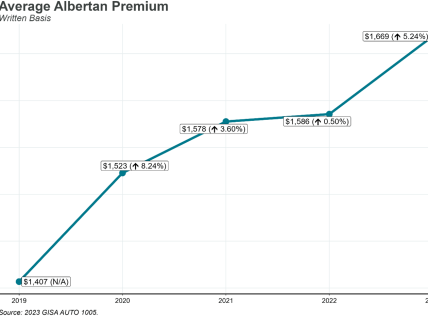What is a credit score?Â
Your credit score is a three-digit number representing your credit history and financial behaviour. It rates your creditworthiness, or how well you manage your credit.
For reference, credit scores range from 300-900. Credit scores at 560 or above are deemed as fair or above average. Remember that younger people may have lower credit because they have had less experience paying off their credit, not necessarily because of poor financial situations. The best way to improve your credit score is to pay your obligations in full and on time and monitor the accuracy of your credit report. Â
What does credit score have to do with insurance premiums?Â
Credit scores capture risk behaviours indicative of insurance claims losses, so it can be used as a rating factor to predict an applicant’s willingness and ability to pay premiums.Â
In Alberta, credit score can only be used for optional insurance not basic, or mandatory, coverage.
What is the benefit of sharing credit scores with insurers?Â
- Discounts: Insurers are permitted to use credit score as an added discount for optional insurance like collision or comprehensive coverage. While good credit can decrease your premiums, low credit cannot increase your premiums. Insurers can also credit score to extend payment terms. Your premiums will not be affected, but you may get offered more payment plans, like monthly premiums, if you have better credit. If a policyholder has a credit score under 560, they are unlikely to receive a premium discount on their auto insurance policy.Â
- Fairer Premiums: Using credit score as a rating factor allows for a more fair and accurate assessment of risk. Consumers who pose less of a risk to claims are likely to have higher credit scores, so they should be paying lower premiums.Â
- Competition: Using multiple different risk factors allows for more competition between insurers. While some companies offer the credit score discount, others might not. Each insurer has a different way to calculate premiums, as well as possible discounts from credit scores, and consumers can choose which insurer to go to.Â
- Consumer Control: Unlike other rating factors like gender or age, credit score is a factor a consumer can control. Credit scores are indicative of a consumer’s financial habits and can be improved with good financial hygiene.Â
What does this mean for my privacy?Â
Credit scores do not contain any personal information or specifics about financial spending but is gathered from a credit file to reflect a person’s financial situation at a specific point in time. Credit scored cannot be stored or archived and are not part of a consumer’s credit file. Since every insurer must comply with privacy laws in Alberta, they should require you to sign a consent form before collecting your credit score and will not be able to store or archive your data when not in use. Â
How much of a discount can I get?Â
To know if you can get a discount on your premium from your credit score, ask your insurer. They will be able to tell you if you qualify for one and the details about the discount they can provide. Again, all insurers calculate premiums differently, so your discount at one company may vary from another company.Â
If you’d like to check your own credit score, use resources like TransUnion Canada or other online resources. It is a good practice to check your credit score to know your current financial status and to ensure there is no false information on it. Â





